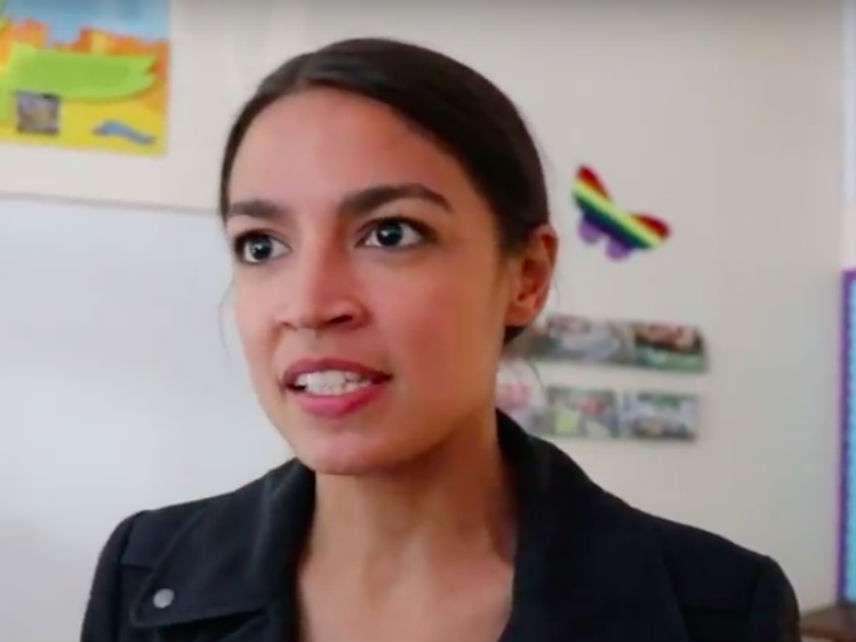Can the Democrats Really Win 2020 with a New Green Deal?
Alexandria Ocasio-Cortez thinks so.

"This is going to be the New Deal, the Great Society, the moon shot, the civil rights movement of our generation," declaimed Rep.-elect Alexandria Ocasio-Cortez (D–N.Y.) at a "Solving Our Climate Crisis" townhall this week. She was referring to the idea of a Green New Deal, which Mother Jones describes as "a complete realignment of the U.S. economy for a carbon-free future." Not wanting for ambition, Ocasio-Cortez added this goal: "We can use the transition to 100 percent renewable energy as the vehicle to establish economic, racial and social justice in America."
Ocasio-Cortez and her allies have yet to propose any Green New Deal bills. (The first step, she says, is to create a House Select Committee to devise the relevant legislation.) Until then, we'll have to rely on the leftist group Data for Progress' vision of what a Green New Deal would look like. By their lights, the feds should aim for 100 percent renewable electricity by 2035 by shuttering all natural gas and coal-fired generation plants. All fossil fuel emissions should be ended by 2050. All new passenger automobiles for sale in 2030 should be zero emissions vehicles; all rail, vehicles, and aviation should be totally fossil-fuel free by 2050. Other parts of the Green New Deal include reforesting 40 million acres of public and private land by 2035, greatly expanding mass transit systems, upgrading local water supply and management infrastructure, expanding federal regulation of the waters of the U.S., and requiring that all materials be recyclable by 2040.
The centerpiece of the New Green Deal would be the creation of 10 million new green jobs in its first ten years. "A Green New Deal requires a massive workforce for the construction, operations, and administration of projects, and a federal job guarantee program can ensure there are enough workers to meet that need," says the Data for Progress proposal. "A job guarantee is a legal right that obligates the federal government to provide a job for anyone who asks for one and to pay them a livable wage."
Pointing to problems that may need to be addressed is all well and good, but when it comes to how to pay for the proposed vast transformation of the U.S. economy, the Data for Progress folks basically punt. The most that the Data for Progress report does is hand-wave toward repealing the recent tax cuts and rolling back military spending. But guaranteeing 10 million green jobs alone would require roughly to $500 billion annually, assuming full-time employment at $15 per hour.
The Data for Progress proposal cites some polls that supposedly show that Americans back a Green New Deal, including 64 percent support for a renewable electricity mandate, 71 percent for EPA regulation of carbon dioxide emissions, 74 percent for vehicle fuel efficiency standards, and 55 percent for a green job guarantee. But would Americans really support higher fuel and electric bills along with higher taxes to support this ambitious program? An October 2017 poll from the University of Chicago strongly suggests not. While 61 percent of Americans in that survey think that climate change is a problem, the pollsters report, "questions on how much they would personally be willing to pay to confront climate change (in the form of a monthly fee on their electric bill) reveal great disparity. While half are unwilling to pay even one dollar (emphasis added), 18 percent are willing to pay at least $100 per month."
"The Green New Deal is one of the most interesting—and strategic—left-wing policy interventions from the Democratic Party in years," writes Robinson Meyer at The Atlantic. Meyer thinks that the green jobs guarantee will be so seductive a lure that voters will hardly notice that their taxes have increased along with the costs for heating and cooling their houses and fueling their cars. Perhaps, but given the French workers' fierce reaction to a relatively minor 12 cent per gallon increase in their gasoline taxes, this proposed "left-wing policy intervention" may be less "interesting" to U.S. voters than progressives like Ocasio-Cortez suppose.


Show Comments (197)